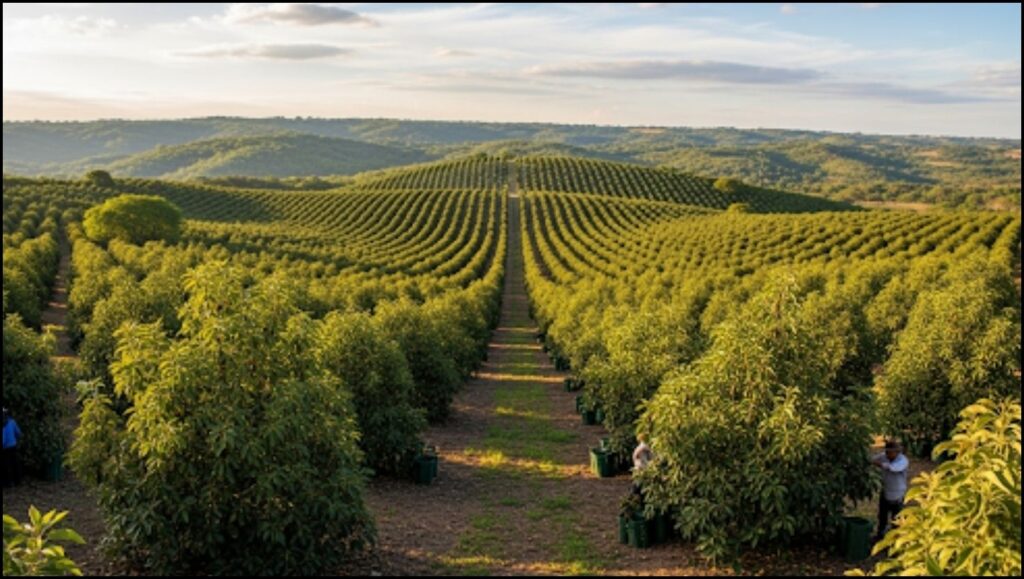Mexico has firmly established itself as the world’s largest avocado producer, a position solidified by years of record-breaking harvests driven by surging global demand. The country’s production has consistently outpaced competitors, making it the undeniable leader in the international avocado trade. This dominance is the result of a unique combination of ideal climatic conditions, generational farming expertise, and strategic trade partnerships, which have turned the Hass avocado into a major economic driver for the nation.

Mexico Solidifies Position as World’s Largest Avocado Producer
| Key Fact | Detail/Statistic |
| Production Leader | Mexico produces more than one-third of the world’s avocados, with an annual output exceeding 2.5 million metric tons. |
| Top Export Market | The United States accounts for over 80% of Mexico’s avocado exports, driven by consumer demand. |
| Key Growing Region | The state of Michoacán is Mexico’s primary production hub, responsible for nearly 80% of the country’s avocado output. |
Mexico’s ascent to the top of the avocado industry is a modern success story of agricultural innovation and market responsiveness. According to a 2024 report from the U.S. Department of Agriculture (USDA) Foreign Agricultural Service, the country’s avocado production reached approximately 2.65 million metric tons in 2023, a four percent increase from the previous year. This figure is projected to grow to 2.77 million metric tons in 2024, a testament to the industry’s sustained expansion. The report attributes this continued growth to a blend of favorable growing conditions and robust export demand, particularly from the United States.
The state of Michoacán remains the epicenter of this agricultural boom, accounting for a significant majority of the country’s output. The region’s unique volcanic soil, temperate climate, and consistent rainfall create an ideal environment for growing the highly sought-after Hass variety. These conditions allow for year-round harvesting, a critical advantage that ensures a steady supply for global markets.
The Economic and Social Impact of “Green Gold”
The immense profitability of avocados has led many to dub them “green gold.” The industry’s value in Mexico now surpasses that of other major exports, including beer and tequila. For many farmers, cultivating avocados has provided an unprecedented path to economic stability, enabling them to invest in their communities and improve their livelihoods.
However, this rapid expansion has not been without significant social and environmental consequences. The high value of the crop has attracted the attention of organized crime syndicates, who have infiltrated the supply chain. These groups often extort farmers for “protection fees” and use intimidation tactics to control production and export routes. This has led to a complex and dangerous dynamic in key growing areas, with some communities taking measures to protect their land and their industry.
Dr. Isabel Ramírez, a geographer from the Center for Research in Environmental Geography at the National Autonomous University of Mexico (UNAM), notes that while the industry provides significant economic benefits, its unregulated expansion poses serious risks. “The avocado boom has created a situation where not all avocados are the result of sustainable practices,” she said in an interview. “It is essential to distinguish between responsible growers and those who contribute to illegal deforestation and water depletion.”
Environmental Challenges and Sustainability Efforts
The cultivation of avocados is a water-intensive process. A single avocado requires a substantial amount of water to grow, making it a thirsty crop. As a result, the expansion of avocado orchards has been linked to water scarcity in several regions. Farmers, both legal and illegal, have been known to divert water from local springs and rivers, impacting water availability for local communities and native ecosystems.
Furthermore, the desire to capitalize on the lucrative market has led to illegal deforestation. Reports from environmental watchdog groups, such as a 2023 investigation by Climate Rights International, detail instances where pine and oak forests in Mexico are cleared to make way for new avocado plantations. This practice threatens the country’s biodiversity, including the critical monarch butterfly reserve located in Michoacán, and contributes to soil degradation.
In response to these concerns, both Mexican and international bodies are working to promote sustainable practices. The Association of Avocado Exporting Producers and Packers of Mexico (APEAM), which represents the country’s avocado industry, has stated its commitment to ensuring all avocados exported to the U.S. are grown legally and sustainably. In early 2024, U.S. Ambassador to Mexico Ken Salazar emphasized the importance of this commitment, stating that avocados from deforested or otherwise illegal operations should not enter the U.S. market.
The Global Landscape: Growing Competition and Future Trends
While Mexico maintains its dominant position, other countries are rapidly increasing their avocado production to meet the expanding global appetite. Nations such as Colombia, Peru, and the Dominican Republic have emerged as major players. According to data from the Food and Agriculture Organization of the United Nations (FAO), Colombia’s production has seen a significant increase in recent years, positioning it as the second-largest producer globally. Peru, with its strong seasonal supply chain, has also become a key exporter to both North American and European markets.
This growing competition could reshape the market dynamics, but experts say Mexico’s established infrastructure and year-round production cycle give it a durable competitive advantage. The country’s close proximity to the immense consumer market in the United States, facilitated by trade agreements like the United States-Mexico-Canada Agreement (USMCA), further secures its role as the primary supplier.
The future of the avocado industry will likely be defined by a balancing act: meeting the insatiable global demand while addressing the critical issues of environmental sustainability, water management, and social responsibility. As consumer awareness grows, the pressure on producing countries to certify their supply chains and implement ethical farming practices will only intensify.
How Malaysia Became the World’s Largest Durian Cempedak Producer
